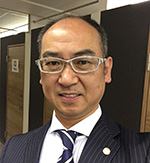I opened my own tax accountant's office in April 2019. I was determined to balance my work and studies.

Soichi Tsuchiya
Tax Professional Course Completed in March 2017
What made you choose the Graduate Graduate School of Accounting & Finance, MBA Program?
I chose Graduate School of Accounting & Finance, MBA Program at this university because I happened to find out about it in a graduate school information magazine for working adults at a bookstore. At the time, I had been working at a tax accounting firm for 30 years and had passed three subjects in the tax accountant exam, so I only had my sights set on passing five subjects in the tax accountant exam and thought it would be impossible to attend graduate school while working. However, after attending three entrance information sessions, I learned that it was possible to take classes all day on Saturdays and Sundays and in the evenings on weekdays, and decided that it would be possible to balance work and study, which was the key to my choice.
What have you noticed or changed since learning about it?
Learning at this university's graduate school lived up to my expectations. Not only were the hard aspects such as the facilities and Library, but the soft aspects such as the administrative staff, Professor, and curriculum content were also excellent. Furthermore, the majority of my fellow students were working adults, and they were all extremely serious about achieving their goals. This environment and meeting my fellow students was a great asset and experience for me. My attitude towards learning also changed through studying at this university's graduate school. Until now, I had focused on practical techniques and cramming for exams, but studying at graduate school taught me the attitude of looking sharply at questions and digging deep into research. I believe this attitude will be of great use to me in the future.
What was the most difficult part of writing your master's thesis?
This was my first experience writing a master's thesis, so I first researched what a master's thesis was and what format it should take. The hardest part was choosing a topic. I earned 50 credits (at the time) through the curriculum at this university, and through those courses I became interested in tax law, especially international tax law. I expanded on that question as my topic and created a blueprint with four chapters and each chapter divided into four sections. Creating this blueprint for the chapters and sections was the most difficult part.
How was the guidance from your teachers?
The professors at our graduate school, some of whom were active in academic fields and others in practical fields, were all serious, rigorous, and enthusiastic in their approach to me. I understood that this came from their confidence and pride in their careers, and that they were thinking about what graduate students would be able to do after completing their studies. Therefore, I did my best in all the courses I took as much as possible. I am especially grateful to my seminar advisor Professor, Dr. Zhao, for his strict guidance in selecting themes, writing chapters and sections, and so on.
What kind of strategies did you use to manage your work and time while you were in school?
I had a hard time balancing work and study. Work is my livelihood, and I can't slack off at all. Therefore, during my two years at graduate school, I devoted all my time outside of work to studying. I spent about four hours after overtime on weekdays, all day on weekends including classes, and even on New Year's holidays, especially on writing my master's thesis. What I want to convey here is that it's important to be prepared, as well as to be creative. Graduate school life is based on two years. These two years are very short. In order to balance work and study, I want you to be prepared, forget about other distractions and hobbies, and focus on work and study.
Do graduate students interact with each other after completing their programs?
After graduating from our graduate school, we have a social gathering twice a year in April and September, where almost all of the students, including the graduates and current students, gather around the professor to socialize and exchange information. Graduates exchange information on how to succeed as a professional accountant, while current students exchange information on how to get to the point of writing a master's thesis. For me, interacting with the friends I met at our university has encouraged and motivated me in my future work.
Has your career changed since you completed your degree? (Did your two years at graduate school lead to your current job?)
Before entering the graduate school of this university, I had passed three subjects in the tax accountant examination, so after graduating, I applied to the National Tax Agency for an exemption from two tax law subjects, and after receiving notice of the exemption in November 2018, I registered as a tax accountant with the Kanda branch of the Tokyo Certified Public Tax Accountants Association in January 2019. I then left the tax accounting firm where I had worked for 30 years and started my own practice in front of Kanda Station on April 1, 2019.
Please give a message to those who are thinking about taking the exam in the future.
I believe that the majority of students who wish to enter our graduate school are aiming to become professional accountants, such as tax accountants or certified public accountants. In that sense, our graduate school offers the best facilities (including administrative staff), Professor, and the opportunity to meet serious peers who share the same goal. Many of our graduates are already working as professional accountants. It is up to you, the student who wishes to enter, to make the most of this excellent environment. I hope you will believe in our graduate school and do your best.